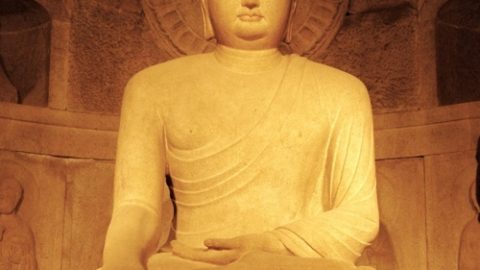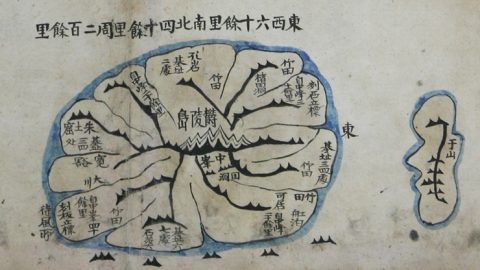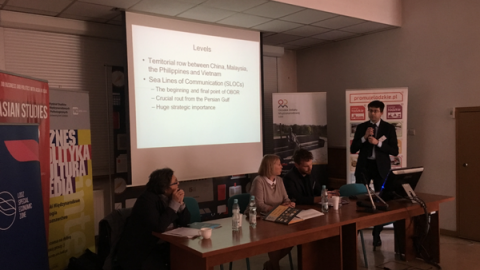‘I identify myself as a freelance Korean public relations expert. My job is to make the country known to the rest of the world.
Seo Kyoung-duk is a man of solitary hope.
He invests his life savings to publish ads about his native Korea in major American newspapers.
He was an advocate for Korea on its territorial claims to Dokdo in the New York Times in 2005.
That ad was followed by two others printed in The Wall Street Journal and The Washington Post in 2005 and 2007.
They concerned the issues of the marking of whats known locally as the East Sea as the Sea of Japan on world maps and the rights of comfort women, or the sex slaves who were made to serve to the Japanese army during World War II.
Despite his propagandist tasks, one factor clearly sets him apart from other Korean nationalists his objectives are not entirely political, as some commonly think.
I identify myself as a freelance Korean public relations expert, says Seo, a 34-year- old graduate student of landscape architecture at Korea University.
My job is to make the country known to the rest of the world.
On a recent weekday evening, he is clad in a casual outfit, the typical attire of a Korean college student. He is at his friends studio near Seoul National University.
Seo is kind and polite, enthusiastically explaining his latest work on the Northeast Project, a Chinese government-funded research project to prove that their ancient kingdoms had ruled Balhae and Goguryeo, from which Korea derived its name.
In February, Seo is posting another ad that denounces the projects scheme.
Hes already contacted the marketing staffs at major American newspapers, although he wont say which ones.
I can see the size of my future house becoming smaller little by little after every ad, he jokes.
Regarding the astronomical costs of the newspaper ads, he says, Oh, what can you do?
Seos public relations tactics follow mass marketing techniques that are common in overseas political campaigns, but are rare in Korea.
Last year, he sent out letters to 700 U.S. government officials, pleading with them to support the surviving comfort women in seeking an official apology from Japan.
The recipients included members of the U.S. Senate and House of Representatives, President George W. Bush and Secretary of State Condolezza Rice.
Then in April, he posted an ad about the comfort women in The Washington Post with a picture of a sobbing victim at a hearing of the U.S. House of Representatives held earlier last year.
Two months later, there was blowback.
The Japanese government sponsored a full page ad in the same newspaper, titled The Facts.
The ad tried to refute Seos earlier claim that there is no evidence that the Japanese army forcibly conscripted the women as sex slaves.
By July, the debate reached a new level.
The U.S. House of Representatives unanimously agreed to pass Resolution 121, which officially acknowledged that an estimated 200,000 women from all over Southeast Asia were taken hostage by the Japanese military to work as sex slaves.
Seos major splash came two years earlier, through an ad in The New York Times proclaiming Koreas territorial rights on the Dokdo Islets, known as Takeshima in Japan.
The placement had a dramatic impact on readers, both conceptually and visually.
On a gray background, the ad had a giant slogan filling two-thirds of the space.
It read, Dokdo is Korean Territory with a short supporting paragraph and Seos Web address at the bottom.
It had no advertiser name or phone number.
The ad brought a surge of emotional fervor online.
His server crashed twice after the ad ran, and his mailbox was flooded with a mix of encouragement and angry letters asking for Seos identity.
In one of the letters, a second-grader offered to donate his entire savings, asking Seo to reclaim Koreas rights to Dokdo.
I didnt put my name on the ad on purpose, Seo says.
It heightened the effect of the ad that way. But I also thought my place in the campaign wasnt that important, because I was only delivering the popular views of Koreans, not my own. I was just being a connector.
In 2005, Seo published another ad in The Wall Street Journal, asserting that the East Sea should be called the Sea of Korea on all world maps.
He deliberately singled out a bulletin board on his Web site, because it could turn into grounds for debate, which might complicate his message or serve as a favorable tool to the opposition.
For Seo, his Web site was adequate as a one-way tool to spread his countrys view.
I wanted to stick to publicity as publicity, Seo says.
But still it was nothing like promoting a cell phone. I just couldnt think straight to sell a product. I often feel like I am standing in the middle of an axis, trying to balance our past on my left, and the future on my right.
Nevertheless, Seos projects are original because they come from a one-man company.
After all, he is not a lawmaker or an NGO activist.
He makes his living through part-time marketing jobs to pay for his ads.
He has no corporate sponsors; he doesnt come from a wealthy family either, he says.
Every time a new ad runs, I feel like I am being investigated by people, he says.
They are trying to track down who is behind me. There isnt anyone.
Years before his newspaper ad projects, Seo was a young student who enjoyed traveling.
His lifes transformation came when he left on his first backpacking trip to Europe during his third year at university.
There, it came as a shock to Seo that no one he met in Europe really knew about South Korea.
His pride suddenly crumbled to ashes, he says.
I was eating gimbap [rolled rice] on a street in Italy one day, and people who passed me asked if it was Japanese sushi, he says. I couldnt believe what I was hearing.
On the same trip, Seo accomplished his first Korean public relations project.
On Aug. 15, the day Korea was liberated from Japan, he mobilized a group of Korean backpackers at the Eiffel Tower in Paris, and sang the national anthem on the street.
I hadnt heard the Korean anthem that loud in a long time, he says in an inspired tone.
I couldnt forget the eyes of people watching us, filled with so much respect.
Ever since that incident, Seos life hasnt been the same.
He attracted a sponsor to provide $50,000 for the publication of English pamphlets about Korean art at the Smithstonian Institutions National Museum of Natural History.
He convinced The Museum of Modern Art and the Metropolitan Museum of Art in New York to install a Korean audio guide.
His friends fondly think of Seo as a person of rare passion for a man his age.
Some people look at him with pity, a young man without a proper job, says Jung Kwang-hoon, a graphic designer who works closely with Seo on his Web site.
But he takes the fact that he was born in Korea very seriously. You could call that patriotism. But its like a child from a poor family who acknowledges his parents without being ashamed of what he was born into.
Park Jae-hwan, managing director at GK Power, a card manufacturer who collaborated with Seo to fund the Smithstonian Institution pamphlet project, describes Seo as a hidden missionary of Korea.
He has a very strong view of Korean history, Park says.
Seos political motives for the ads, however, still remain a bit unclear.
The day I close my eyes, I want my people to be as powerful as the Jews and the Chinese, he says.
As I tell my little niece, I will make sure she is not ashamed of being Korean by the time she grows up and travels abroad with a Korean passport.
That partly explains the name of his Web site (www.forthenextgeneration.com), which contains a sensational tag on the top of the main page that reads, We are spreading the truth.
Asked again for a third time whether he sees himself as a patriot, he gives a weary sigh.
Why shouldnt I be? he says. Of course I am proud of Korea.
By Park Soo-mee Staff Reporter [myfeast@joongangco.kr]



